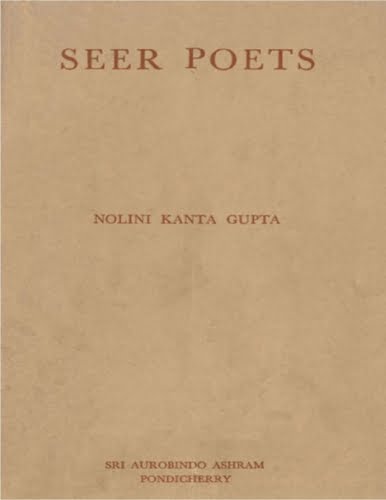Seer Poets by Nolini Kanta Gupta

Seer Poets
In this essays, Nolini Kanta Gupta presents example of poetry inspired from the inner sight.
Vision is the characteristic power of the poet, as is discriminative thought the essential gift of the philosopher and analytic observation the natural genius of the scientist. The Kavi was in the idea of the ancients the seer and revealer of truth, and though we have wandered far enough from that ideal to demand from him only the pleasure of the ear and the amusement of the aesthetic faculty, still all great poetry instinctively preserves something of that higher turn of its own aim and significance. Poetry, in fact, being Art, must attempt to make us see, and since it is to the inner senses that it has to address itself,—for the ear is its only physical gate of entry and even there its real appeal is to an inner hearing,—and since its object is to make us live within ourselves what the poet has embodied in his verse, it is an inner sight which he opens in us, and this inner sight must have been intense in him before he can awaken it in us.
Sri Aurobindo, The Future Poetry
The poetic genius can manifest in two ways. The one is artificial imagination, the other is divine vision or direct experience. The artificial imagination is nothing but fancy. This fancy may be superbly fascinating but that would be the restive cleverness of the fickle vital and the outward senses – the delight of thought, of the critical reason; on the other hand, the divine or direct experience illumines the thing-in-itself, the truth. This is the truth-vision of the soul, the Psychic Being. The poet who depends only on fancy may possibly be a poet but never the seer-poet who sees with the divine vision and creates. In fact, the seer-poet sees nothing save spirituality. We have shown above the difference between the spiritual and the mundane aspect of the truth. But in reality in the eyes of the seer-poet there is no such distinction at all. The divine sees the Self not only in things spiritual but also in things terrestrial. Even when the seer-poet speaks of the gross, the body, he speaks of the truth behind the gross, the truth behind the body-self. The totally material and vulgar can never be the object of fine art.
Nolini Kanta Gupta
Book Details
Complier: Nolini Kanta Gupta
Print Length: 67 pages
Publisher: Sri Aurobindo Ashram
Submitted by: Avinash Tiwari
Book format: PDF, ePub, Kindle
Language: English
Book Download
Contents
- A Vedic Story
- Rishi Dirghatama Dirghatama
- The Shakespearean Word
- Two Sonnets of Shakespeare
- Robert Graves
- Boris Pasternak
- George Seferis
- Jules Supervielle
- Two Mystic Poems in Modern French
- Two Mystic Poems in Modern Bengali
- Hymn to Darkness
- Mysticism in Bengali Poetry
- Rabindranath and Sri Aurobindo
Book Sample
Seer Poets by Nolini Kanta Gupta
A VEDIC STORY
(RlGVEDA – X. 51.)
The gods are in a great fix. Where is Agni Agni? How is it that the comrade has disappeared all on a sudden? The Sacrifice—the great work has to be undertaken. And he is to be the leader, for he alone can take up the burden. There is no time to be lost, everything is ready for the ceremony to start and just at the moment the one needed most is nowhere. So the gods organise a search party to find out the Whereabouts of the runaway god.
The search party consists of Varuna, Mitra and Yama. We shall presently understand the sense of the selection. They look about here and there—in ten directions, it is
mentioned—and at last spot the defaulting god hiding within a huge thick strong cloak or caul. They hail him and ask him to come out and take up his charge. Agni refuses: he says he is not competent to undertake the burden; indeed that is why he ran away and they must not force him. The gods explain, entreat, encourage Agni. They say and assure him that no harm will come to him, rather he will flourish and prosper and become immortal. He is mighty and he will become almighty as he takes up his work and proceeds with it. Agni accepts in the end and marches out with the gods.
What does this parable mean? First of all then we must know what Sacrifice—a Vedic sacrifice—is. Sacrifice symbolises the cosmic labour, the march of the universe towards its goal, the conquest of Light over Darkness, the ascent of manhood to godhead, the flaming rise and progress of consciousness to its supreme expression and embodiment. It is the release out of Inconscience and Unconsciousness to consciousness and finally into the superconsciousness.
…
